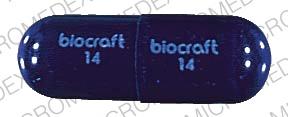Oxacillin Side Effects
Medically reviewed by Drugs.com. Last updated on Aug 22, 2025.
Applies to oxacillin: parenteral injection, parenteral powder for injection.
Side effects include:
Hypersensitivity reactions; local reactions (phlebitis, thrombophlebitis); renal, hepatic, or nervous system effects with high dosage.
For healthcare professionals
Applies to oxacillin: injectable powder for injection, intravenous solution, oral capsule, oral powder for reconstitution.
Hypersensitivity adverse events
- Common (1% to 10%): Allergic reactions (included immediate and delayed reactions)
- Rare (0.01% to 0.1%): Anaphylactic shock
- Very rare (less than 0.01%): Anaphylactic shock resulting in death
- Frequency not reported: Immediate allergic reaction (included urticaria, pruritus, angioneurotic edema, laryngospasm, bronchospasm, hypotension, vascular collapse, death), accelerated immediate allergic reaction (included urticaria, pruritus, fever, laryngeal edema, laryngospasm, hypotension), delayed allergic reaction (included serum sickness-like reactions [i.e., fever, malaise, urticaria, myalgia, arthralgia, abdominal pain], various skin rashes), anaphylaxis[Ref]
Immediate allergic reactions usually occurred within 20 minutes of administration and ranged in severity from urticaria and pruritus to angioneurotic edema, laryngospasm, bronchospasm, hypotension, vascular collapse, and death; such immediate anaphylactic reactions were very rare and usually occurred after parenteral therapy but have occurred with oral therapy. An accelerated immediate allergic reaction has occurred between 20 minutes and 48 hours after administration and has included urticaria, pruritus, and fever; although laryngeal edema, laryngospasm, and hypotension occasionally occurred, fatality was uncommon.
Delayed allergic reactions to penicillin therapy usually occurred after 48 hours and sometimes as late as 2 to 4 weeks after starting therapy. Manifestations of this reaction included serum sickness-like symptoms (i.e., fever, malaise, urticaria, myalgia, arthralgia, abdominal pain) and various skin rashes.[Ref]
Gastrointestinal
- Frequency not reported: Pseudomembranous colitis, nausea, vomiting, diarrhea, stomatitis, black or hairy tongue, gastrointestinal irritation, Clostridium difficile-associated diarrhea[Ref]
Onset of pseudomembranous colitis symptoms have occurred during and after antibiotic therapy.
Nausea, vomiting, diarrhea, stomatitis, black or hairy tongue, and gastrointestinal irritation have occurred, especially during oral penicillin therapy.[Ref]
Dermatologic
- Frequency not reported: Rash, urticaria, pruritus[Ref]
Hematologic
- Frequency not reported: Neutropenia, bone marrow depression, agranulocytosis, leukopenia, thrombocytopenia, eosinophilia[Ref]
Hepatic
- Frequency not reported: Hepatotoxicity, abnormal liver function tests (mainly elevated AST levels), cholestatic jaundice, severe hepatitis, abnormal GGT serum levels[Ref]
Nervous system
- Frequency not reported: Neurotoxic reactions, seizures[Ref]
Neurotoxic reactions (similar to those observed with penicillin G) have occurred with large IV doses, especially in patients with renal dysfunction.[Ref]
Other
- Frequency not reported: Fever, abnormal alkaline phosphatase serum levels[Ref]
Renal
- Frequency not reported: Renal tubular damage, interstitial nephritis, renal insufficiency, nephropathy, acute renal failure[Ref]
Genitourinary
Local
- Frequency not reported: Thrombophlebitis, tissue necrosis after extravasation[Ref]
Metabolic
- Frequency not reported: Severe hypokalemia[Ref]
See also:
References
1. (2001) "Product Information. Bactocill (oxacillin)." SmithKline Beecham
2. Dahlgren AF (1997) "Adverse drug reactions in home care patients receiving nafcillin or oxacillin." Am J Health Syst Pharm, 54, p. 1176-9
3. Friedman RJ, Mayer IE, Galambos JT, Hersh T (1980) "Oxacillin-induced pseudomembranous colitis." Am J Gastroenterol, 73, p. 445-7
4. Thomas E, Mehta JB (1984) "Pseudomembranous colitis due to oxacillin therapy." South Med J, 77, p. 532-3
5. Maraqa NF, Gomez MM, Rathore MH, Alvarez AM (2002) "Higher occurrence of hepatotoxicity and rash in patients treated with oxacillin, compared with those treated with nafcillin and other commonly used antimicrobials." Clin Infect Dis, 34, p. 50-4
6. Carpenter J (1980) "Neutropenia induced by semisynthetic penicillin." South Med J, 73, p. 745-8
7. Slovick FT, Bamberger DM, Stark KR (1989) "Spontaneous clostridial myonecrosis in a man with drug-induced agranulocytosis." South Med J, 82, p. 1272-4
8. Passoff TL, Sherry HS (1978) "Oxacillin induced neutropenia. A case report." Clin Orthop, 135, p. 69-70
9. Chu JY, O'Connor DM, Schmidt RR (1977) "The mechanism of oxacillin-induced neutropenia." J Pediatr, 90, p. 668-9
10. Leventhal JM, Silken AB (1976) "Oxacillin-induced neutropenia in children." J Pediatr, 89, p. 769-71
11. Kahn JB (1978) "Oxacillin-induced agranulocytosis." JAMA, 240, p. 2632
12. Brook I (1977) "Leukopenia and granulocytopenia after oxacillin therapy." South Med J, 70, p. 565-6
13. Fallon JA, Tall AR, Janis MG, Brauer MJ (1978) "Oxacillin-induced granulocytopenia." Acta Haematol, 59, p. 163-70
14. Ahern MJ, Hicks JE, Andriole VT (1976) "Neutropenia during high dose intravenous oxacillin therapy." Yale J Biol Med, 49, p. 351-60
15. Miller WI, Souney PF, Chang JT (1983) "Hepatic dysfunction following nafcillin and cephalothin therapy in a patient with a history of oxacillin hepatitis." Clin Pharm, 2, p. 465-8
16. Tauris P, Jorgensen NF, Petersen CM, Albertsen K (1985) "Prolonged severe cholestasis induced by oxacillin derivatives." Acta Med Scand, 217, p. 567-9
17. Deboever G (1987) "Cholestatic jaundice due to derivatives of oxacillin." Am J Gastroenterol, 82, p. 483
18. Halloran TJ, Clague MD (1979) "Hepatitis associated with high-dose oxacillin therapy." Arch Intern Med, 139, p. 376-7
19. Olans RN, Weiner LB (1976) "Reversible oxacillin hepatotoxicity." J Pediatr, 89, p. 835-8
20. Dismukes WE (1973) "Oxacillin-induced hepatic dysfunction." JAMA, 226, p. 861-3
21. Trevenzoli M, Cattelan AM, Mencarelli R, Meneghetti F (2003) "Severe hepatitis associated with oxacillin therapy." South Med J, 96, p. 324-5
22. Tillman DB, Oill PA, Guze LB (1980) "Oxacillin nephritis." Arch Intern Med, 140, p. 1552
23. Fromm LA, Graham DL (1999) "Oxacillin-induced tissue necrosis." Ann Pharmacother, 33, p. 1060-2
24. Schlaeffer F (1988) "Oxacillin-associated hypokalemia." Drug Intell Clin Pharm, 22, p. 695-6
More about oxacillin
- Check interactions
- Compare alternatives
- Pricing & coupons
- Drug images
- Dosage information
- During pregnancy
- Drug class: penicillinase resistant penicillins
- Breastfeeding
- En español
Patient resources
Professional resources
Related treatment guides
Further information
Oxacillin side effects can vary depending on the individual. Always consult your healthcare provider to ensure the information displayed on this page applies to your personal circumstances.
Note: Medication side effects may be underreported. If you are experiencing side effects that are not listed, submit a report to the FDA by following this guide.

